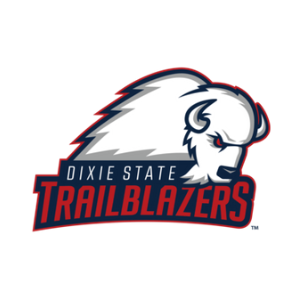St. George Spectrum & Daily News
St. George, UTAH (November 1, 2018) – Dixie State is moving closer and closer to transitioning from Division II to Division I. In a recent Division I feasibility report, consulting group Collegiate Consulting determined that DSU was in a “strong position” to make the jump.
The study claimed that DSU can expect an invitation from the Western Athletic Conference if it commits to the move. DSU athletic director Jason Boothe said that if everything goes to plan, the Trailblazers could begin their first year as a WAC member on July 1, 2020.
“We didn’t actively seek this out, the WAC sought us out,” Boothe said. “They need schools. They need teams.”
Western Athletic Conference commissioner Jeff Hurd said he had “no comment” when it came to DSU’s proposed move into the conference.
Dixie State has scheduled three town hall meetings to discuss the potential move. Those will take place on Nov. 6 for the student body, Nov. 7 for faculty and staff, and Nov. 7 for the community. All will be held in the DSU Gardner Center Cottam Room.
What’s needed?
There are some things DSU would have to do to make the transition. DSU would have to increase the number of athletic scholarships, increasing to a full 63 football scholarships to allow DSU to play the guaranteed-money games against FBS schools that help fund athletic programs. DSU would also have to more than double the amount of athletic department administration staffers to reach the WAC average. DSU currently has 16 staff members; the WAC average is 35.50. And the study recommended six more full-time coaches be hired.
The facilities, though, are in place. Or, in the case of the Human Performance Center, will soon be. But there could be a snag: football. The WAC doesn’t sponsor football and only one of its members, New Mexico State, currently fields a team.
In its feasibility study, Collegiate Consulting recommended that “Dixie State should only consider an invitation from the WAC if the conference is actively exploring adding a sponsorship of football.”
The study stated the WAC had confirmed that it was exploring the possibility of starting an FCS football conference. So what would a potential WAC football league look like?
As an FBS independent, New Mexico State may be interested in an FCS dropdown, and University of Texas Rio Grande Valley already has had a football feasibility report done. So there should be some interest among current WAC members to start a football league. But is there enough?
UMKC is thinking about leaving the conference due to travel concerns. Utah Valley has bet big on wrestling, which has a spot in the Big 12, and men’s soccer. Grand Canyon athletics has indicated that football isn’t in its future. Chicago State has toyed with the idea of adding it — but making it a non-scholarship sport. So an FCS football conference out of the existing WAC teams seems like more of a pipe dream than anything, but the league could also have football-only members like the Big Sky has with Cal Poly and UC Davis.
“They are exploring it and there is a good chance of them pulling something together based on our discussions with them,” Boothe said. “What that is? I don’t know. That’s all in the WAC’s hands.”
If football is not on option in the WAC, DSU will have to add another men’s sport to join the league. Boothe said that would likely be a men’s swimming or men’s tennis team since the school already has those facilities.
Other potential football options?
Boothe said that even if the WAC can’t field a football league, DSU would find a way around it. The creation of the WAC FCS league isn’t a requirement for DSU to join the league in all other sports. And there are some other options for DSU’s football squad if the WAC football league never materializes.
The Pioneer Football League is a non-scholarship FCS conference and Boothe said there were internal discussions about going that route but, ultimately, the athletic department decided it wasn’t something it wanted to pursue.
Boothe prefers the other alternative: FCS Independent.
While it’s not a long-term plan, Boothe said he’s comfortable having football be an independent for the time being — especially since that would allow the program to be eligible to play guaranteed-money games against FBS teams.
As for the Big Sky, the home of Southern Utah and Weber State, Boothe said that wasn’t an option.
“Informally through discussions, we know they are not interested in expanding at this point,” Boothe said.
The cost
While it looks like things are near the end of the road, nothing is official.
Boothe said that all approval meetings and decisions should happen by the end of November. DSU would be required to pay a $1.7 million application fee and submit a copy of the feasibility study and Division I strategic plan. If the move does happen, Boothe said student fees will go up and that the athletic department would pull more from tuition during the transition than it traditionally has, but, he quickly, added, it will be worth it.
“All the benefits that would come along with it on the athletic side, on the academic side, on the enrollment side, on the retention side, on all that, it’ll be worth it,” he said.
